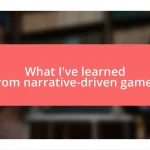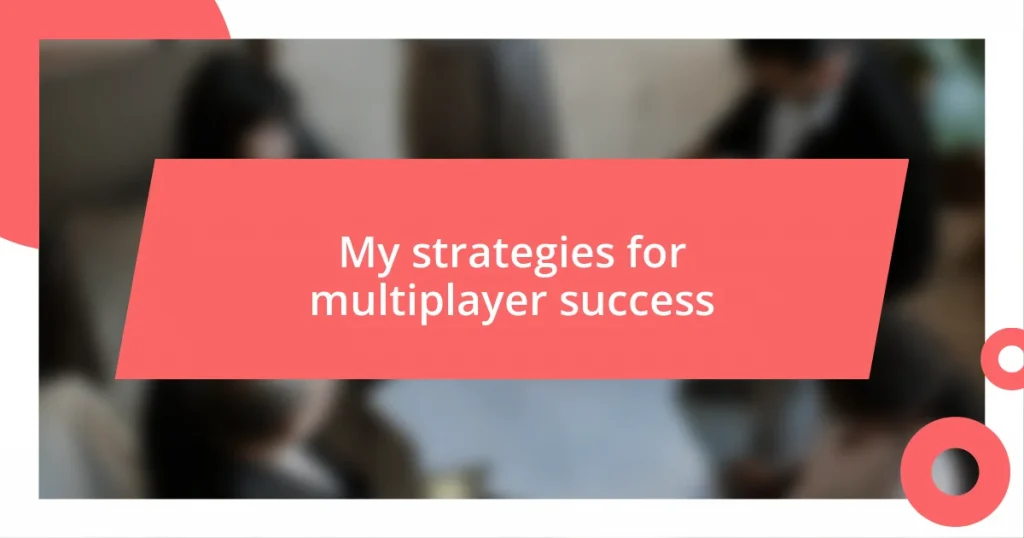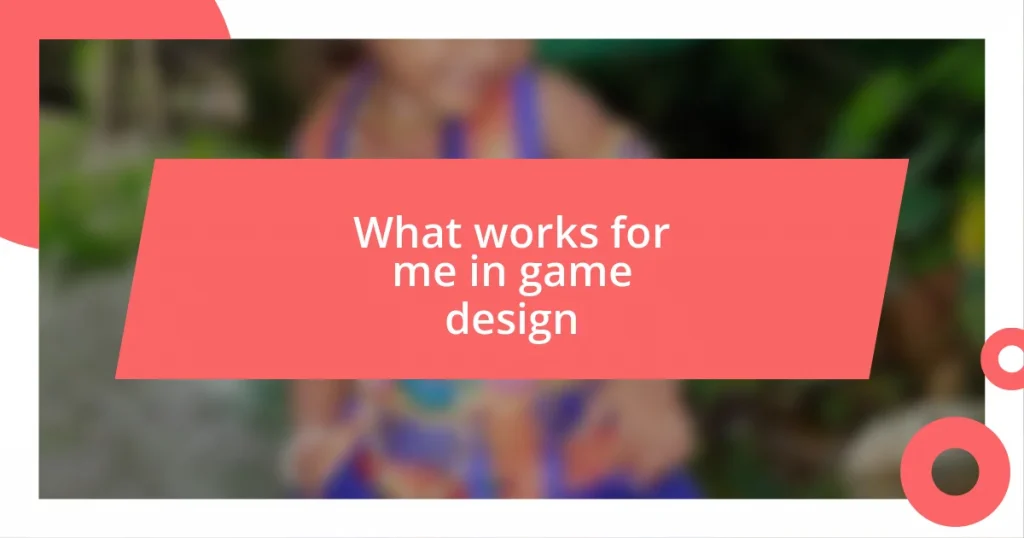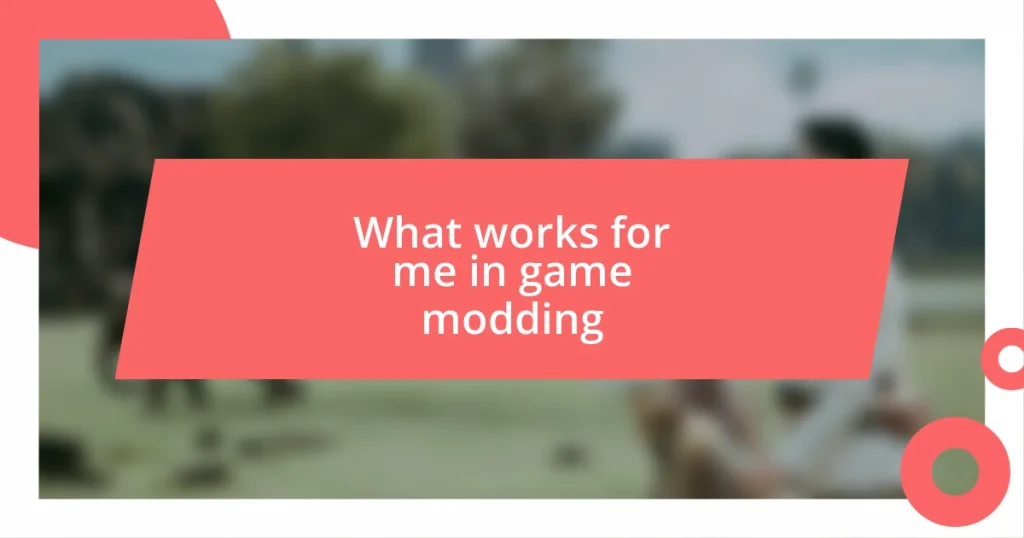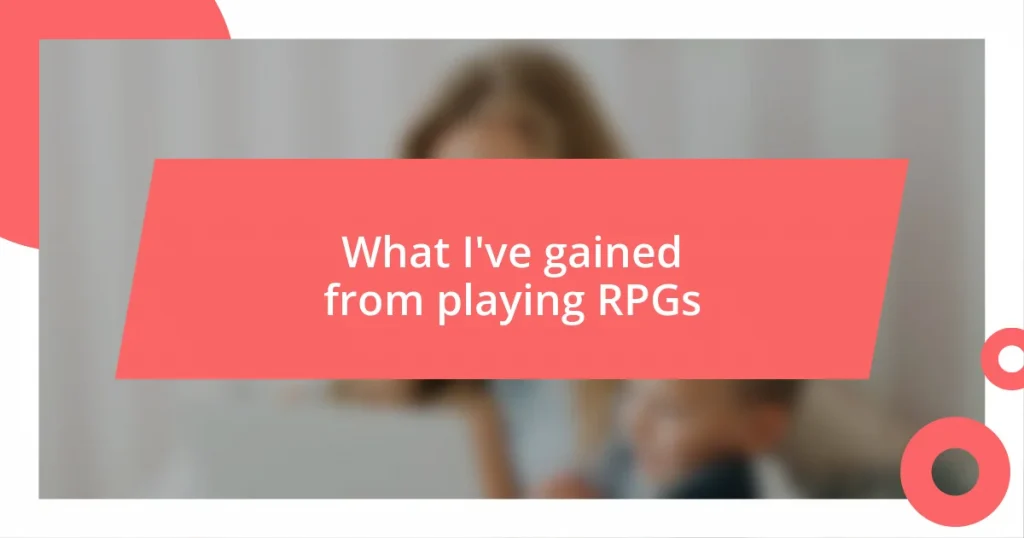Key takeaways:
- Understanding game mechanics and character roles enhances teamwork and gameplay performance.
- Effective communication, such as using voice chat and establishing trust, significantly impacts team success.
- Regular practice and reviewing gameplay help identify mistakes and improve skills, fostering a deeper connection to the game.
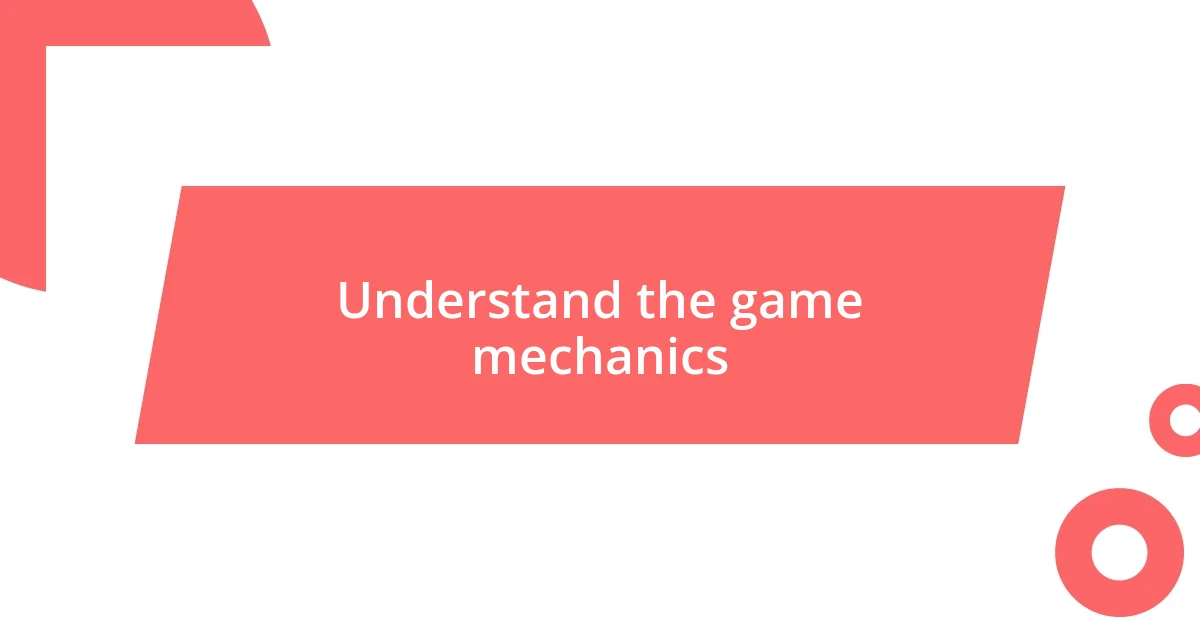
Understand the game mechanics
Understanding game mechanics is crucial for multiplayer success. I remember the first time I joined a MOBA match; I was overwhelmed by the intricate mechanics and how they affected teamwork. Did I really grasp the importance of map awareness? Not at all! It took several matches before I truly understood how positioning and objectives could turn the tide in our favor.
When I finally delved into the intricacies of the gameplay, everything clicked. I learned that every character had unique abilities, roles, and synergies that were vital for strategic plays. Have you ever experienced the thrill of executing a perfectly timed combo? That rush of adrenaline reminds me why fully comprehending these mechanics is key—it’s where the fun and competition truly lie.
Equipped with this understanding, I noticed how my gameplay improved significantly. I started engaging more with my teammates, sharing insights about enemy cooldowns or suggesting tactical retreats. The emotional shift was profound; I went from feeling lost to being an integral part of a cohesive unit. So, how deeply do you know your game’s mechanics? I can tell you, diving deep will transform your experience!
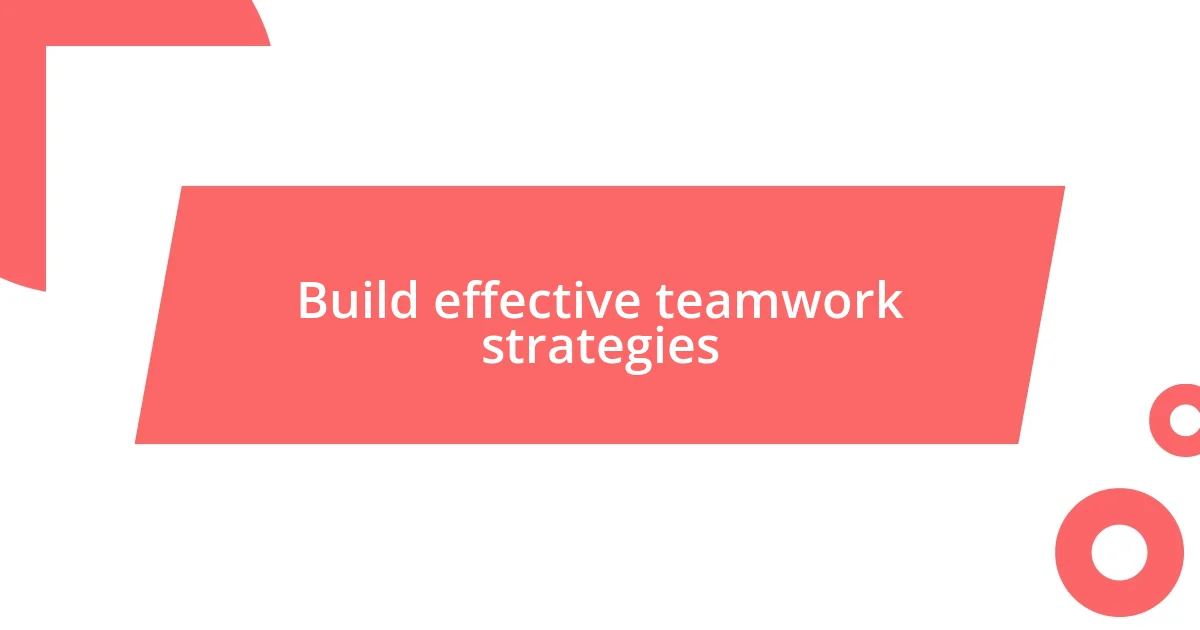
Build effective teamwork strategies
Effective teamwork strategies are the backbone of success in multiplayer games. One memorable experience I had in a team-based shooter highlighted this perfectly. Our team initially struggled because we operated as individual players rather than a unit. However, once we established clear roles and communicated openly, our synergy improved dramatically. I felt a sense of belonging as we began to anticipate each other’s moves, and trust developed amid the chaos of battle.
To foster effective teamwork, consider these strategies:
– Establish clear roles: Define who does what based on individual strengths.
– Communicate consistently: Use voice chat or ping systems to share vital information without hesitation.
– Build trust: Trust your teammates’ decisions and give constructive feedback.
– Celebrate small victories: Acknowledge team successes to build morale and encourage continued collaboration.
– Adapt and improve: After each match, reflect on what worked and what didn’t, and discuss how to enhance teamwork.
By embracing these strategies, I’ve witnessed firsthand how a group of individuals can evolve into a cohesive, winning team. It’s fulfilling to share victories, knowing we achieved them together, rather than as isolated players.
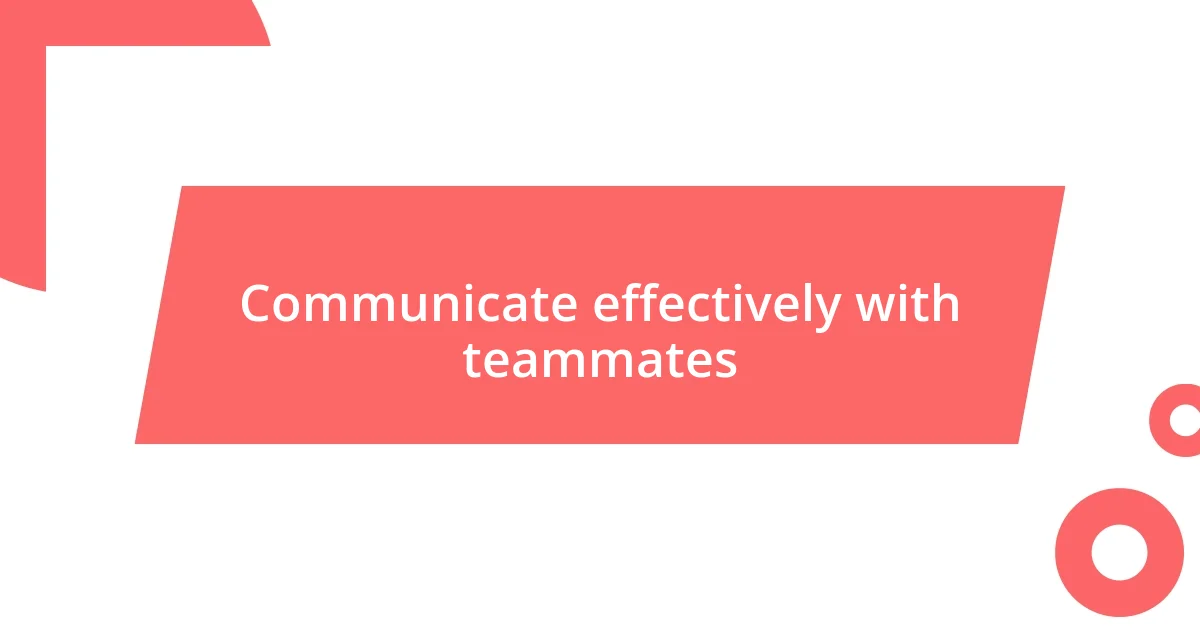
Communicate effectively with teammates
Communicating effectively with teammates can be the game-changer in every multiplayer setting. I recall a moment when my squad and I were on the brink of defeat in a battle royale. Instead of panicking, we switched to an open communication channel, and I suggested a flanking maneuver. In those tense seconds, I felt a surge of confidence as we organized our approach. We went from nearly losing to securing a surprise victory, all thanks to clear communication.
Having face-to-face interactions, even if virtual, makes a huge difference. For instance, I’ve often noticed that when my team uses voice chat, we can convey emotions and urgency much better than through text. It’s like the difference between reading a letter and hearing someone speak passionately. I can’t stress enough how vital it is to create a space where teammates feel comfortable sharing concerns and strategies.
| Communication Method | Effectiveness |
|---|---|
| Voice Chat | Immediate response and emotional connection |
| Text Chat | Good for sharing detailed strategies but lacks immediacy |
| Ping Systems | Quick, visual cues to direct attention |
| Face-to-Face (in-game) | Enhances trust and camaraderie |
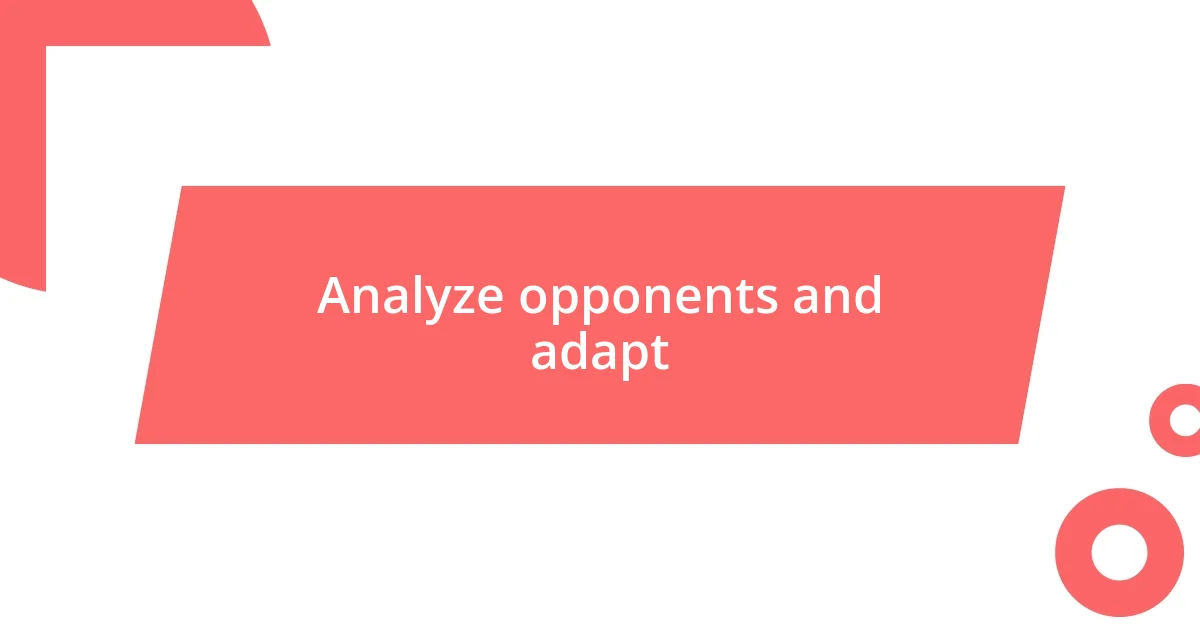
Analyze opponents and adapt
Analyzing opponents and adapting your strategies can truly shift the tide in multiplayer games. I remember a match where our team faced an aggressive squad known for their quick takedowns. Instead of sticking to our usual gameplay, I suggested we observe their patterns first. As I watched them closely, I noticed their tendency to overcommit when attacking. This insight spurred us to set traps and catch them off-guard, leading to a comeback I still brag about.
It’s surprising how often players overlook the importance of adaptation. Have you ever had that moment when you realize your usual tactics aren’t working against a specific team? I’ve been there, feeling frustration creep in as the enemy outmaneuvered us. Instead of staying stuck in our rigid playstyle, we pivoted, utilizing defensive strategies to their aggressive assaults. Those adjustments made us not only resilient but also flexible—traits that turned the game around.
I genuinely believe that understanding your opponents can deepen your gameplay experience. In one unforgettable match, our foes relied heavily on snipers perched atop high ground. Rather than charging in blindly, I led a strategic rotation to flank their position. The thrill of turning the tables when they thought they had the upper hand was electric. Each time I adapt to the dynamics of the game, it reminds me that success often lies in observation and learning from others.
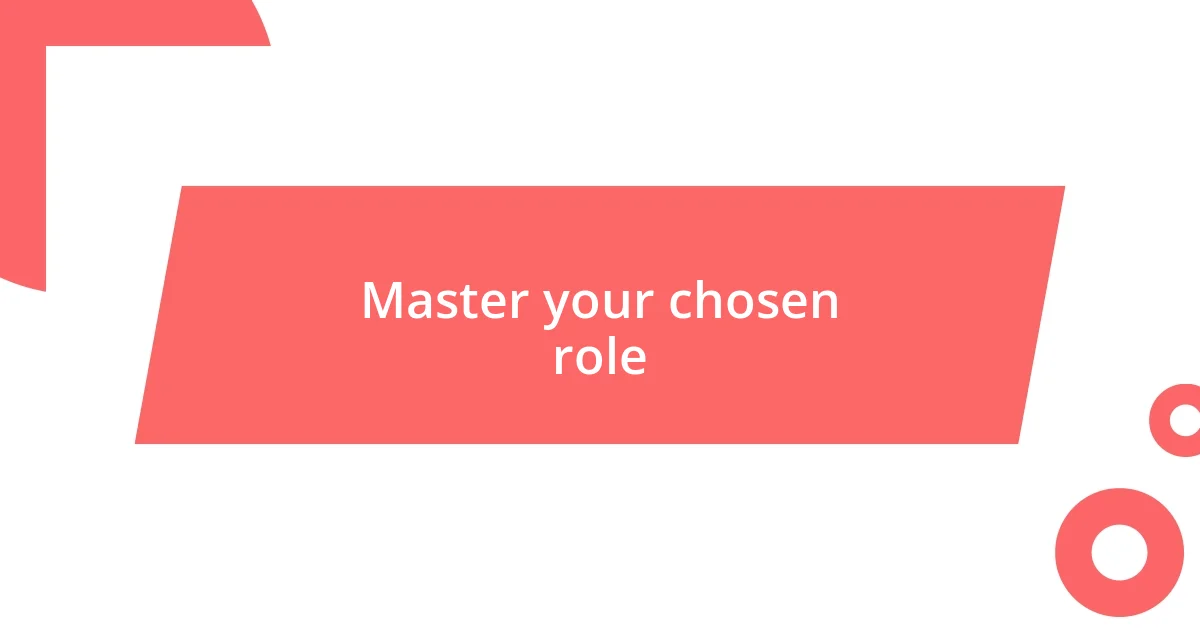
Master your chosen role
Mastering your chosen role in multiplayer games is like honing a craft that directly impacts the entire team’s performance. Reflecting on my own experience, I remember playing as a healer in a group dungeon. Initially, I focused solely on keeping my teammates’ health bars full, often losing sight of my positioning and movement. However, as I became more aware of my surroundings and enemy placements, I realized the importance of timing my heals while dodging attacks. I felt empowered knowing that I wasn’t just a lifeline; I could actively contribute to the team’s success through strategic positioning.
Have you ever thought about how mastering your role can change the game completely? I often find that immersing myself in the nuances of my character or function not only boosts my confidence but also strengthens the team’s synergy. Take, for instance, my exploration of different playstyles. When I switched from a tank to a damage dealer, it was eye-opening. I discovered that understanding the timing and weaknesses of my opponents gave my team openings we could exploit. That shift in perspective made me come alive during gameplay, as I developed a rhythm that coordinated seamlessly with my teammates.
Ultimately, it comes down to embracing your role and continuously striving for improvement. I once had a match where I played support, and a well-timed ultimate ability turned the tide in our favor. The exhilaration of seeing my influence on the game was indescribable. The satisfaction of mastering my role didn’t just elevate my performance; it also deepened my connection to the game and my team. The more we understand our roles, the more we realize the unique and vital contributions we all bring.
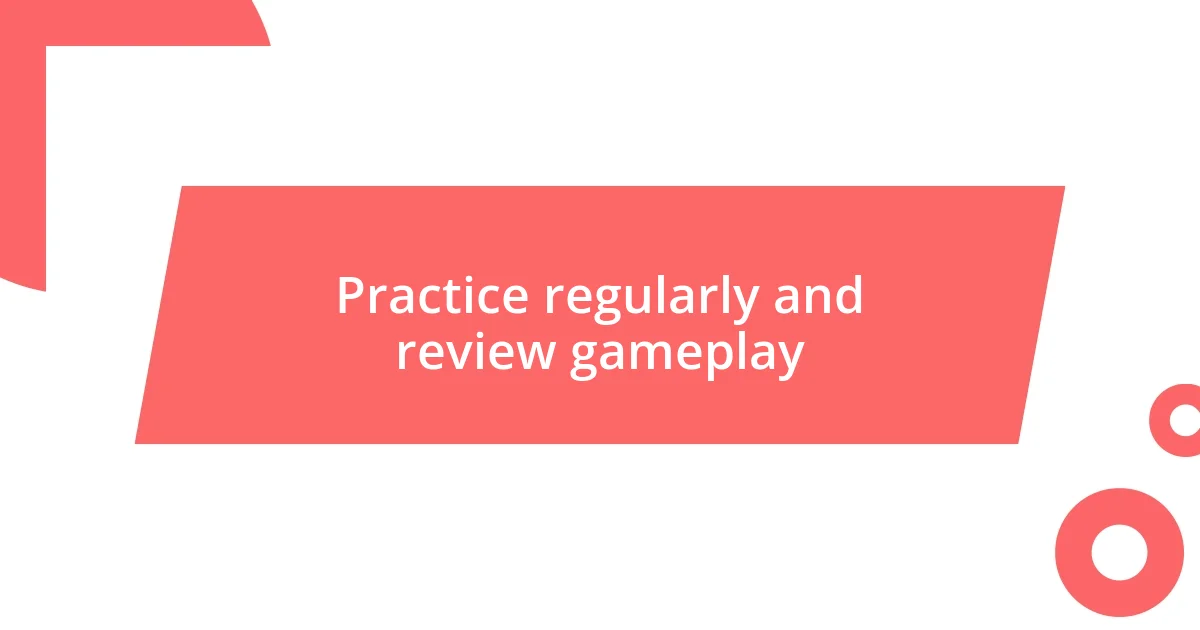
Practice regularly and review gameplay
Practice is the heartbeat of improvement in multiplayer games. I recall my early days, when I would dive into matches without any warm-up, leading to awkward mistakes and missed opportunities. Once I made a commitment to practice regularly, those mistakes started to fade. Each session not only sharpened my skills but also deepened my understanding of the mechanics—something that made a drastic difference in my gameplay.
Have you ever watched your own gameplay back? I strongly recommend it. I used to consider it dull, but reviewing my matches became a revelation. Spotting my own errors and missed chances opened my eyes to strategies I hadn’t even considered before. When I analyzed recordings from critical matches, I could pinpoint where I faltered or triumphed, turning those moments into lessons for future games. It’s like having a casual chat with myself about what works and what doesn’t—an honest reflection that pushes me to evolve.
Incorporating practice and gameplay review into my routine transformed my approach to multiplayer gaming. The thrill of seeing my progress over time is incredibly rewarding. I remember feeling that rush when I conquered a tricky scenario I once struggled with, knowing that consistent practice had built my confidence. Each playthrough became an opportunity to refine my strategies and adapt to new challenges. In my experience, it’s not just about playing the game; it’s about actively engaging in the process of becoming better.



